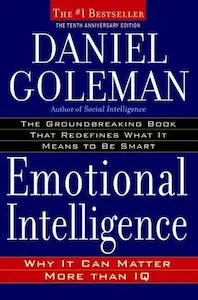Emotional Intelligence - Summary
Daniel Goleman

Introduction
In his groundbreaking book “Emotional Intelligence,” Daniel Goleman explores the concept of emotional intelligence and its profound impact on various aspects of our lives. Goleman argues that emotional intelligence, often overlooked in traditional measures of intelligence, plays a crucial role in personal and professional success. By understanding and harnessing our emotions effectively, we can navigate relationships, make sound decisions, and lead fulfilling lives. This book summary will delve into the key ideas presented by Goleman, highlighting examples and anecdotes to illustrate the power of emotional intelligence.
Understanding Emotional Intelligence
Emotional intelligence encompasses the ability to recognize, understand, and manage our own emotions, as well as the emotions of others. Goleman emphasizes that emotional intelligence is not fixed at birth but can be developed and strengthened throughout our lives. He explores how emotional intelligence influences our interactions with others, shapes our behavior, and impacts our overall well-being.
The Importance of Self-Awareness
Goleman highlights self-awareness as the foundation of emotional intelligence. By being aware of our own emotions, we gain insight into our strengths, weaknesses, and triggers. This self-awareness allows us to regulate our emotions effectively and make conscious choices rather than reacting impulsively. For instance, Goleman shares the story of a manager who, through self-awareness, recognized her tendency to become defensive during team meetings. By acknowledging this, she was able to actively listen and respond constructively, fostering a more positive and productive work environment.
Managing Emotions
Emotional intelligence involves managing our emotions in a way that promotes personal growth and positive relationships. Goleman explains that individuals with high emotional intelligence are adept at handling stress, remaining resilient in the face of challenges, and maintaining a positive outlook. He cites the example of a salesperson who, despite facing rejection, persisted and maintained a positive attitude, ultimately achieving success. This ability to manage emotions not only benefits individuals but also contributes to creating a supportive and harmonious atmosphere in teams and organizations.
Empathy and Social Awareness
Understanding and empathizing with the emotions of others is another crucial aspect of emotional intelligence. Goleman argues that empathy allows us to connect with people on a deeper level, fostering stronger relationships and effective collaboration. He shares the story of a teacher who, through empathy, recognized the struggles of a student and provided the necessary support, ultimately transforming the student’s academic performance and self-esteem. By developing social awareness and empathy, we can create inclusive environments that promote understanding and cooperation.
Emotional Intelligence in Leadership
Goleman explores how emotional intelligence is particularly vital in leadership roles. Leaders with high emotional intelligence inspire and motivate their teams, effectively manage conflicts, and make informed decisions. He presents the example of a CEO who, through emotional intelligence, created a culture of trust and collaboration, leading to increased employee satisfaction and organizational success. By prioritizing emotional intelligence in leadership development, companies can cultivate strong and resilient leaders who drive growth and innovation.
Emotional Intelligence in Education
Goleman also addresses the significance of emotional intelligence in education. He argues that by incorporating emotional intelligence training into school curricula, educators can equip students with essential life skills. Goleman shares the story of a school that implemented emotional intelligence programs, resulting in improved academic performance, reduced disciplinary issues, and enhanced social skills among students. By nurturing emotional intelligence in educational settings, we can empower future generations to navigate challenges, build healthy relationships, and thrive in diverse environments.
Emotional Intelligence and Health
The impact of emotional intelligence extends beyond personal and professional realms; it also influences our physical and mental well-being. Goleman explores how emotional intelligence contributes to stress management, resilience, and overall health. He discusses studies that demonstrate how individuals with higher emotional intelligence experience lower levels of stress-related illnesses and are more likely to adopt healthy coping mechanisms. By prioritizing emotional intelligence, we can enhance our overall quality of life and promote holistic well-being.
Cultivating Emotional Intelligence
Goleman emphasizes that emotional intelligence is a skill that can be developed through deliberate practice and self-reflection. He provides practical strategies for cultivating emotional intelligence, such as mindfulness, active listening, and seeking feedback. Goleman also highlights the importance of ongoing learning and growth, as emotional intelligence evolves with experience and self-improvement.
Conclusion
In “Emotional Intelligence,” Daniel Goleman presents a compelling argument for the significance of emotional intelligence in all aspects of our lives. By understanding and harnessing our emotions effectively, we can enhance our relationships, make better decisions, and lead more fulfilling lives. Through captivating examples and anecdotes, Goleman demonstrates how emotional intelligence has the power to transform individuals, teams, and entire organizations. By prioritizing emotional intelligence and actively developing this skill, we can unlock our full potential and create a more compassionate and empathetic world.